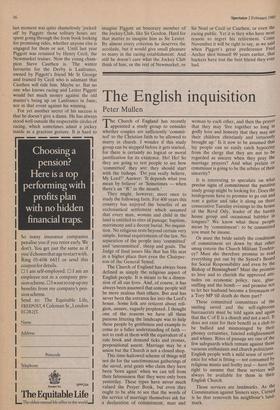The English inquisition
Peter Mullen
The Church of England has recently appointed a study group to consider whether couples are sufficiently 'commit- ted' to the Christian faith to be allowed to marry in church. I wonder if this study group can be stopped before it gets started, for there is certainly no logical or moral justification for its existence. Ho! Ho! So they are going to test people to see how 'committed' they are: they should start with the bishops. 'Do you really believe, My Lord?' Answer: 'It depends what you mean by believe' or 'Sometimes — when there's an "R" in the month.'
They might, however, meet once to study the following facts. For 400 years this country has enjoyed the benefits of an ecclesiastical settlement which assumed that every man, woman and child in the land is entitled to rites of passage: baptism, matrimony and a decent burial. No inquisi- tion. No religious tests beyond certain very simple, formal requirements of the law. No separation of the people into 'committed' and 'uncommitted', sheep and goats. The Judge of final issues like that has His seat in a higher place than even the Chairper- son of the General Synod.
The Church of England has always been defined as simply the religious aspect of English people. It is meant to be a dimen- sion of all our lives. And, of course, it has always been assumed that some people will be more zealous than others. But zeal has never been the entrance fee into the Lord's house. Some folk are reticent about reli- gion, unsure, vaguely perplexed. I thought one of the reasons we have all these parsons littering the landscape was to help these people by gentleness and example to come to a fuller understanding of faith — not to rush at them with the equivalent of a rule book and demand ticks and crosses, propositional assent. Marriage may be a union but the Church is not a closed shop.
This time-hallowed scheme of things will not do for the sanctimonious gatherings of the saved, avid gents who claim they have been 'born again' when we can tell from their fatuousness that they were only born yesterday. These types have never much valued the Prayer Book, but even they ought to be able to see that the words of the service of marriage themselves ask for a declaration of commitment, man and woman to each other, and then the prayer that they may 'live together so long in godly love and honesty that they may see their children christianly and virtuously brought up.' Is it now to be assumed that lay people can so easily catch hypocrisy from the clergy that they are not to be regarded as sincere when they pray the marriage prayers? And what prelate or commissar is going to be the arbiter of their sincerity?
It is interesting to speculate on what precise signs of commitment the putative study group might be looking for. Does the bridegroom have to promise to go out and rent a guitar and take it along on three consecutive Tuesday evenings to the house of the Revd Oily, leader of the barmY house group and occasional babbler In tongues? We know what these people mean by 'commitment': to be committed you must be insane.
Or must the bride satisfy the conditions of commitment set down by that other smug coterie the Church Militant Tenden- cy? Must she therefore promise to read everything put out by the Synod's Board for Social Responsibility and even by the Bishop of Birmingham? Must she promise to love and to cherish the approved atti- tudes on economic policy, race, glue sniffing and the bomb — and promise not to let her husband become a freemason or a Tory MP till death do them part?
These committed committees of the smiling saved and the self-rightebus bureaucrats must be told again and again that the C of E is a church and not a sect. It does not exist for their benefit as a club to be bullied and mismanaged by their phoney certainties, fancied enlightenment and whims. Rites of passage are one of the few safeguards which remain against these vacuous enthusiasts and church politicians. English people with a mild sense of rever- ence for what is fitting — not consumed by religious mania and frothy zeal — have the right to assume that these services Will always be available for them in their English Church.
Those services are landmarks. As the Commination against Sinners says, Cursed is he that removeth his neighbour's land- mark.










































 Previous page
Previous page